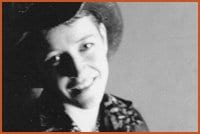Ivan E Coyote is a long-time columnist for Capital Xtra’s Vancouver sibling Xtra West. Loose End is the name of her column and the name of her third book, a collection of stories reworked from her columns. Coyote is a storyteller of the old-fashioned variety; this is not fiction, at least not by usual definitions of the term. These are the kinds of stories that some people tell about the small things, a crazy occurrence on the way to the corner store or a funny turn-of-phrase by a co-worker, odd details that make you think about something you hadn’t thought about for years. In short, Coyote specializes in the minutiae of daily life and the way that the seemingly small things are often more interesting than events that generate headlines.
One of the reasons why Coyote is so successful in this kind of territory is because her world view is more than a little skewed — she’s a she in the biological/hormonal sense but moves through her daily life with a decidedly deliberate gender ambiguity which means that she mostly passes as a boy in straight environments but is a classical butch dyke in queer circumstances. As she explains to her mother: “‘I’ve thought about hormones before,’ I blurted out. ‘I mean, it’s crossed my mind. I always wished I was a boy when I was little. I’ve always been, well, sort of …’ She was silent, so I kept on. ‘But I have decided that, for right now, anyway, that it isn’t the answer for me. Hormones, I mean. I’m okay where I’m at, you know somewhere in the middle.'”
Many of the pieces in this collection revolve around Coyote’s gender ambiguity — whether being asked for ID when buying cigarettes at age 34 or as the victim of a gaybasher. In a story called “Black, Blue And Green” Coyote talks about being gaybashed in broad daylight at a busy Vancouver street corner by a woman, an attack triggered by a disagreement over pay phone etiquette. As she describes the incident and speculates as to why not a single bystander (and there were many) offered any assistance, she writes, “I thought about grabbing her hands to stop her, and, I must admit, I felt like punching her right back. But I knew that at least some of the crowd thought they were witnessing a woman punching a man, and that if I were to be seen by any of them as fighting back or hurting her, that I could be jumped by some guy who thought he was doing the right thing, and seriously pummeled. So I just held my hands in front of my face.”
Most of the other stories don’t have that kind of edge to them (although the one about turning on to her street and seeing her house in flames comes pretty close); the focus is on the ordinary. Coyote grew up in the Yukon and she brings a small-town sensibility to her observations of the big city, about recreating the good parts of small-town life — if you believe that there are good parts of small-town life. She certainly does. The stories are full of family gossip, the often strange behaviour of neighbours and the advantages of being able to perform one’s own car repairs.
There is an interesting emphasis on being a member of a very large extended family. She is proud to claim that she is the oldest of 36 (and counting) cousins and while things don’t always run smoothly in the family, it seems to provide an infinite amount of material. There’s a great piece written in the form of a letter to a younger cousin that turns on the craziness of family dynamics. It’s about who is supposed to know that the cousin in question has embarked on a career as a stripper and that no-one is supposed to say that they know. It’s a delightful take on the impossibility of secrets in a particularly chatty family.
The collection ends with the story of the fire and Coyote’s move from her home of 12 years in Vancouver’s east side to a new place in Squamish, a smallish city about an hour from Vancouver. According to a recent column in Xtra West, the transition will certainly provide a lot of new material. Stay tuned.

 Why you can trust Xtra
Why you can trust Xtra


